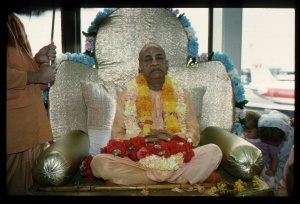SB 11.3.32

A.C. Bhaktivedanta Swami Prabhupada
Please note: The synonyms, translation and purport of this verse were composed by disciples of Śrīla Prabhupāda
TEXT 32
- kvacid rudanty acyuta-cintayā kvacid
- dhasanti nandanti vadanty alaukikāḥ
- nṛtyanti gāyanty anuśīlayanty ajaṁ
- bhavanti tūṣṇīṁ param etya nirvṛtāḥ
SYNONYMS
kvacit — sometimes; rudanti — they cry; acyuta — of the infallible Supreme Lord; cintayā — by the thought; kvacit — sometimes; hasanti — they laugh; nandanti — take great pleasure; vadanti — speak; alaukikāḥ — acting amazingly; nṛtyanti — they dance; gāyanti — sing; anuśīlayanti — and imitate; ajam — the unborn; bhavanti — they become; tūṣṇīm — silent; param — the Supreme; etya — obtaining; nirvṛtāḥ — freed from distress.
Translation and purport composed by disciples of Śrīla Prabhupāda
TRANSLATION
Having achieved love of Godhead, the devotees sometimes cry out loud, absorbed in thought of the infallible Lord. Sometimes they laugh, feel great pleasure, speak out loud to the Lord, dance or sing. Such devotees, having transcended material, conditioned life, sometimes imitate the unborn Supreme by acting out His pastimes. And sometimes, achieving His personal audience, they remain peaceful and silent.
PURPORT
Śrīla Viśvanātha Cakravartī Ṭhākura has explained the symptoms of love of Godhead. Rudanti: The devotees cry, thinking, "Another day has passed, and still I could not obtain Kṛṣṇa. Then what will I do, where will I go, from whom shall I inquire, and who can possibly help me reach Kṛṣṇa?" Hasanti: It is late at night, the sky is dark, and Kṛṣṇa is determined to steal from the house of one of the elderly gopīs. He is hiding underneath a tree in the corner of the courtyard belonging to one of the cowherd men. Although Kṛṣṇa thinks that He is completely concealed, He suddenly hears a voice from one of the elderly members of the family. "Who are You there? Who are You? I say." Thus Kṛṣṇa has been caught, and He begins to flee the courtyard. When this humorous scene is revealed to the devotee, the devotee begins to laugh heartily. Nandanti: When Kṛṣṇa actually reveals His transcendental form to the devotee, the devotee experiences the highest transcendental bliss. Vadanti: The devotee says to the Lord, "O Kṛṣṇa, after so many days I have finally achieved You."
When all of the devotee's senses are absorbed in Śrī Kṛṣṇa, the devotee has successfully transcended the material condition of life. This is indicated by the word alaukikāḥ. Alaukikāḥ, or the transcendental platform, is explained by the Lord in Bhagavad-gītā (BG 14.26):
- mām ca yo 'vyabhicāreṇa
- bhakti-yogena sevate
- sa guṇān samatītyaitān
- brahma-bhūyāya kalpate
"One who engages in full devotional service, who does not fall down in any circumstance, at once transcends the modes of material nature and thus comes to the level of Brahman."
According to Śrīla Śrīdhara Svāmī, ajaṁ harim, anuśīlayanti tal-līlām abhinayanti: "Anuśīlayanti indicates that out of extreme ecstasy the devotees sometimes imitate or act out the pastimes of the Supreme Lord." This ecstatic symptom was manifested by the gopīs in Vṛndāvana during Kṛṣṇa's absence.
In the twenty-first verse of this chapter it was stated that one who has understood that there is no happiness either on earth or in material heaven must surrender at the lotus feet of a bona fide spiritual master. Tasmād guruṁ prapadyeta jijñāsuḥ śreya uttamam (SB 11.3.21). The following verses gave many detailed instructions regarding the activities of a bona fide disciple. Now this verse is describing the mature fruit of devotional service, namely, pure love of Godhead. Everyone has the opportunity to come to this platform of transcendental bliss by taking the dust of the lotus feet of Kṛṣṇa's representative on his head. One should give up the mentality of envy and false prestige and humbly take shelter of the mercy of the Supreme Personality of Godhead. The spiritual master is to be considered the incarnation of the Lord's mercy. There is absolutely no doubt that a sincere soul who serves a bona fide spiritual master will achieve the highest perfection of life (śreya uttamam). He will enjoy eternal bliss and knowledge in the personal abode of the Lord.